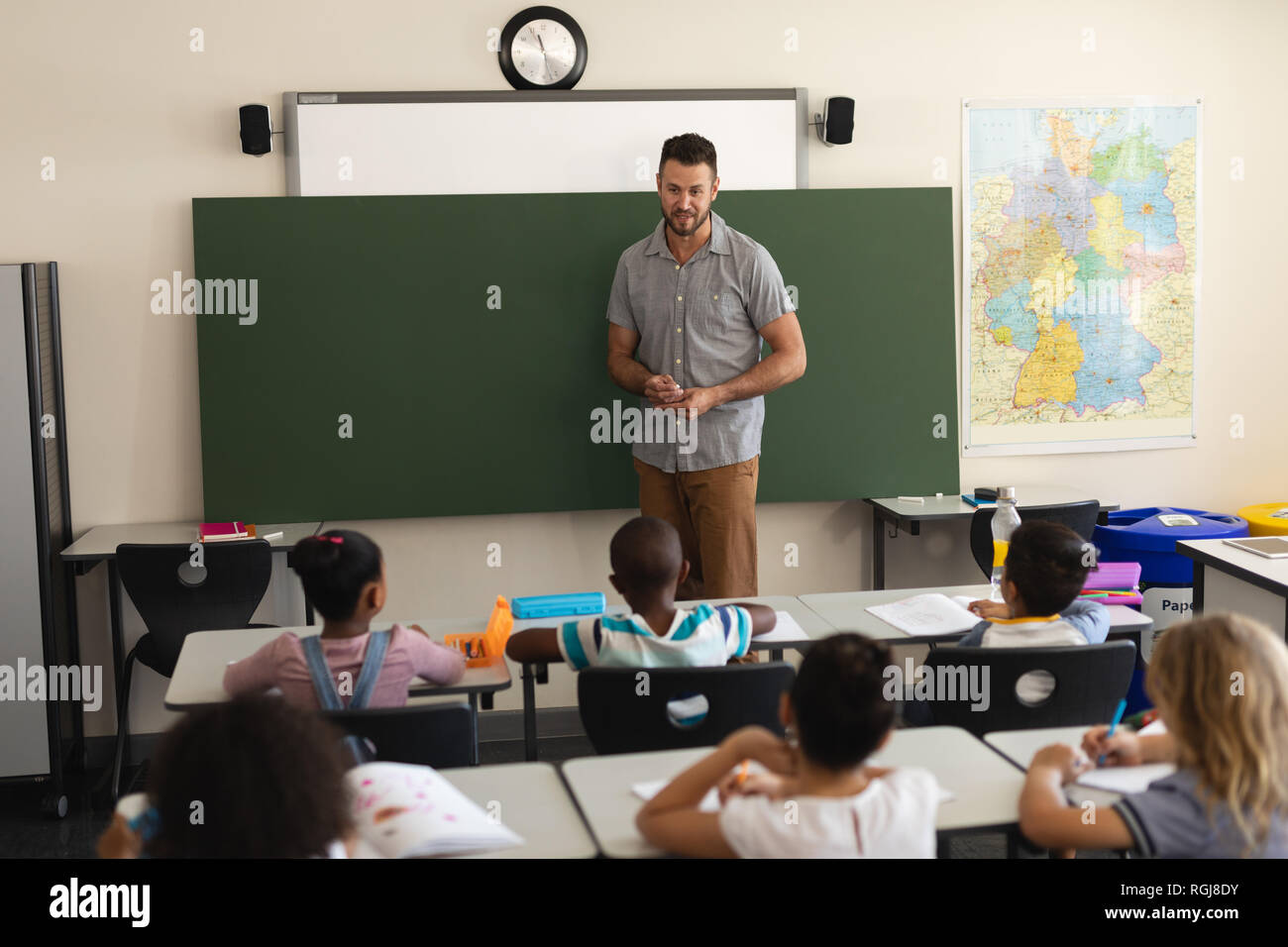Affordable Primary Science Tuition Singapore for All Learning Needs
Affordable Primary Science Tuition Singapore for All Learning Needs
Blog Article
Discover the Important Benefits of Understanding Primary Science for Young Students
The relevance of main scientific research education for young learners prolongs far past mere understanding procurement; it acts as an essential column in establishing crucial skills such as vital reasoning, analytic, and imagination. Involving with clinical principles through interactive and inquiry-based tasks not just cultivates curiosity however likewise lays the foundation for resistant, confident learners. As we check out these benefits additionally, it comes to be clear that the effects for future academic and personal growth are profound. What details methods can instructors use to make the most of these advantages?
Enhancing Crucial Assuming Abilities
Promoting crucial assuming abilities in young learners is vital for their cognitive advancement and future academic success. Critical reasoning enables youngsters to analyze details, examine evidence, and make notified decisions, which are crucial abilities in today's information-rich society. By engaging in scientific query, young learners can improve these skills as they discover ideas through observation, thinking, and experimentation.
In main scientific research education and learning, instructors can promote essential thinking by encouraging pupils to ask questions, develop theories, and conduct experiments. This hands-on technique enables children to exercise analytic and establish rational thinking abilities. For instance, when pupils check out the residential properties of materials or the concepts of movement, they find out to assess their findings seriously and attract verdicts based upon proof.
Furthermore, conversations and collaborative tasks can advertise crucial reasoning by giving possibilities for learners to articulate their ideas, obstacle assumptions, and think about diverse point of views. By creating a helpful environment that values questions and reflection, educators can nurture essential believing skills that equip young students to become lifelong learners and independent thinkers. Ultimately, enhancing these abilities lays a durable structure for their future scholastic ventures and individual growth.
Cultivating Interest and Expedition

Primary science education and learning offers a structured setting where young students can discover different sensations with hands-on experiments and monitorings. By enabling them to communicate with materials and participate in inquiry-based discovering, educators develop opportunities for youngsters to formulate hypotheses, check their concepts, and draw conclusions. Such experiences support a feeling of marvel and excitement concerning scientific research.

Structure Confidence in Trouble Fixing
Structure self-confidence in analytic is an important part of main science education and learning that empowers young learners to approach obstacles with resilience and imagination - primary science tuition Singapore. They develop necessary skills in critical reasoning and evaluation when kids are encouraged to involve with scientific ideas with hands-on tasks and inquiry-based understanding. This process not just improves their understanding of clinical principles but additionally promotes a sense of possession over their understanding
To develop confidence, instructors must produce an encouraging atmosphere where errors are watched as chances for growth as opposed to failures. This urges pupils to take risks and explore different solutions to issues. By offering scaffolding and guidance, instructors can help trainees browse complex jobs, progressively raising their self-reliance in analytic situations.
In addition, joint knowing experiences, such as group jobs or experiments, can additionally improve trainees' confidence as they discover to express their thoughts and pay attention to others' perspectives. These interactions nurture social abilities and enhance the concept that analytical is commonly a collective endeavor. Eventually, growing self-confidence in analytical prepares young learners for future academic obstacles and furnishes them with the devices necessary for long-lasting learning.
Motivating Creativity and Advancement
In the realm of key science education, motivating creativity and technology is crucial for growing a dynamic understanding atmosphere. By promoting a society where young learners can discover ideas and experiment easily, teachers aid students create vital thinking abilities and an enthusiasm for exploration. Imagination in scientific research this contact form motivates youngsters to ask concerns, develop hypotheses, and take part in hands-on tasks that boost their creativity.
Incorporating flexible tasks and inquiry-based learning into the curriculum allows students to share their distinct perspectives and options. For circumstances, when charged with solving a trouble pertaining to their atmosphere, pupils can brainstorm multiple methods, bring about innovative results that showcase their creativity. This not only strengthens their understanding of clinical concepts yet also instills a sense of ownership over their learning process.
In addition, innovative science education nurtures cooperation amongst peers, as students commonly share ideas and improve each other's insights - primary science tuition Singapore. This collaborative spirit advertises not only innovation but additionally important social abilities. Thus, by focusing on imagination and technology in key science education and learning, we equip young students to assume critically, accept difficulties, and imagine opportunities, laying a solid foundation for long-lasting understanding and expedition
Preparing for Future Discovering Challenges
Young students' capability to navigate future understanding challenges hinges on a solid structure in primary scientific research education. This foundational understanding gears up students with essential assuming abilities and a methodical technique to problem-solving, essential for dealing with complicated issues in an ever-evolving globe. Main scientific research promotes inquiry-based knowing, motivating pupils to ask concerns, explore theories, and take part in hands-on experiments.
As they develop these skills, students come to be adept at assessing information, acknowledging patterns, and drawing informed conclusions. Such expertises are crucial not just in clinical fields but likewise in mathematics, modern technology, and engineering (STEM), where interdisciplinary knowledge is increasingly important.
Furthermore, primary scientific research education and learning cultivates a sense of interest and strength in young learners, allowing them to see challenges as possibilities for growth. As they encounter and get over barriers in their clinical expeditions, they build self-confidence in their capability to adjust and introduce.
Inevitably, a strong structure in main scientific research not just prepares young learners for scholastic searches but also outfits them with the tools required for long-lasting understanding and adaptability in a rapidly changing global landscape. By purchasing key scientific research education and learning, we are buying the future possibility of our students.
Conclusion
Comprehending key scientific research is essential for young learners, as it fosters important thinking, inquisitiveness, and imagination. Involving with scientific principles with hands-on experiments enhances analytic capabilities and constructs resilience. This foundational understanding not just outfits pupils to examine data and acknowledge patterns yet additionally Visit Your URL supports an inquiry-based frame of mind. Inevitably, the advantages of main science education and learning prepare children for future scholastic quests and impart lifelong understanding habits crucial for growing in an ever-evolving world.
The relevance of main science education for young students prolongs much beyond simple expertise purchase; it offers as a basic column in developing vital skills such as critical reasoning, analytical, and creativity. By creating an encouraging atmosphere that values questions and representation, instructors can nurture critical assuming skills that encourage young learners to end up being long-lasting students and independent thinkers. Therefore, by focusing on creativity and technology in main science education and learning, we empower young students to think seriously, welcome difficulties, and visualize opportunities, laying a solid structure for long-lasting knowing and expedition.
Young students' capacity to navigate future discovering obstacles hinges on a solid structure in primary scientific research education and learning.Understanding primary scientific research is critical for young learners, Click This Link as it cultivates critical thinking, curiosity, and imagination.
Report this page